Staff Motivation and Productivity Analysis: Beach Petroleum, AU
VerifiedAdded on 2023/04/21
|6
|1166
|251
Project
AI Summary
This research project investigates the impact of staff motivation on the productivity of Beach Petroleum Company in Australia. It addresses the problem of lagging staff motivation within the petroleum industry, as highlighted by the Australian production and exploration association. The research aims to determine factors that minimize the implementation of staff motivation and analyze its benefits within Beach Petroleum. The methodology includes questionnaires for stakeholders and employees, along with interviews with top management. Data sources encompass secondary data from Australian databases and the company's website, supplemented by media and internet resources. The study seeks to provide insights into how organizations can improve staff motivation to enhance productivity, addressing the underperformance often caused by neglecting employee grievances.
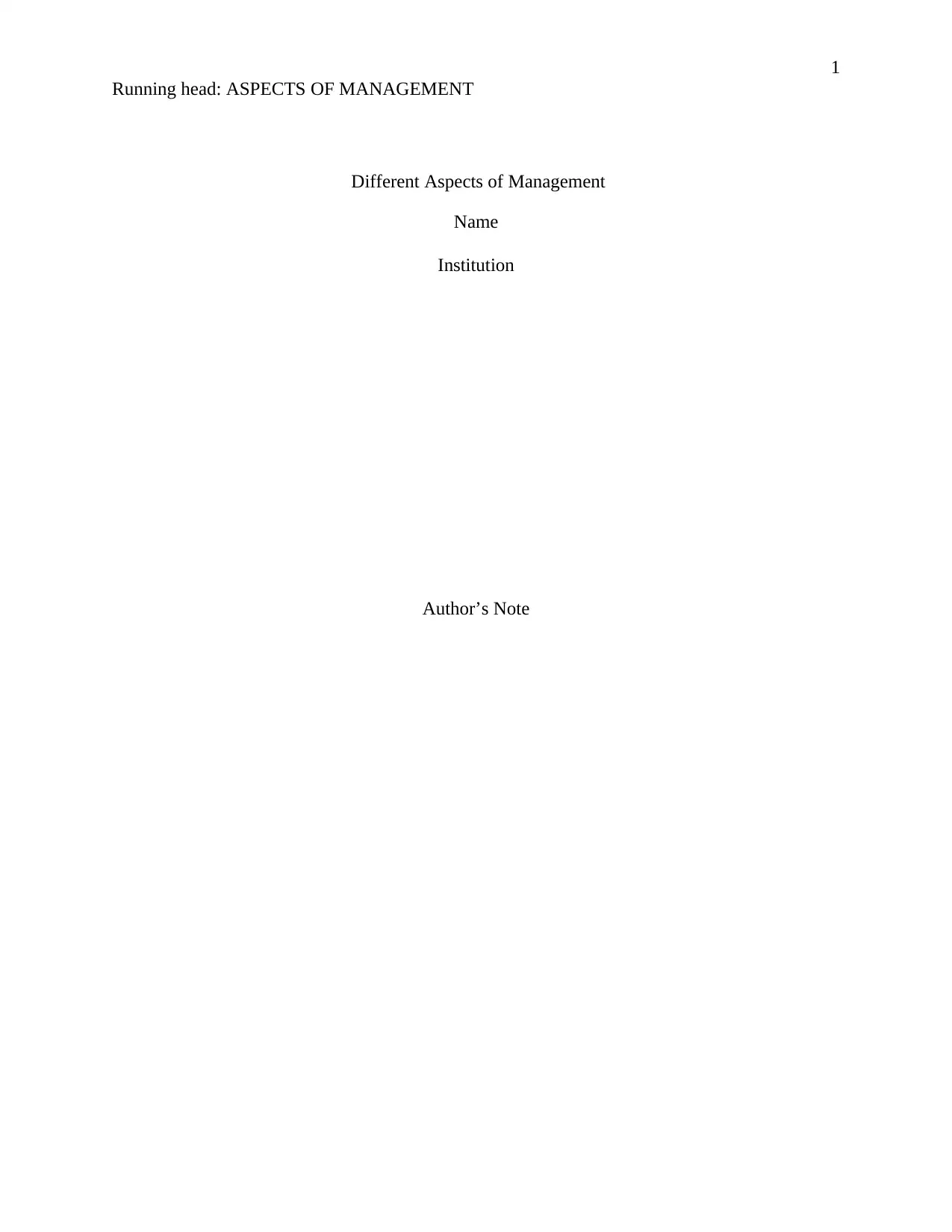
1
Running head: ASPECTS OF MANAGEMENT
Different Aspects of Management
Name
Institution
Author’s Note
Running head: ASPECTS OF MANAGEMENT
Different Aspects of Management
Name
Institution
Author’s Note
Paraphrase This Document
Need a fresh take? Get an instant paraphrase of this document with our AI Paraphraser
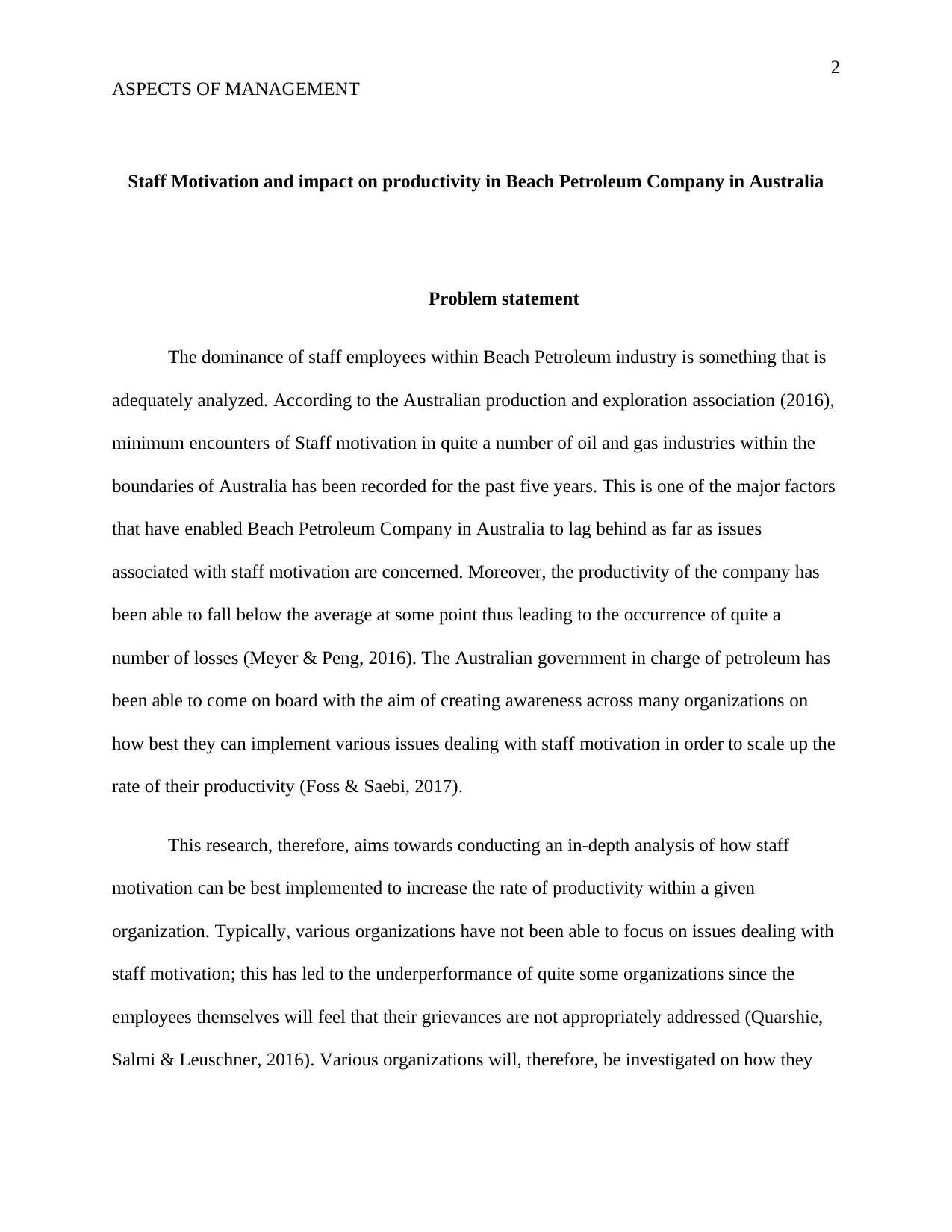
2
ASPECTS OF MANAGEMENT
Staff Motivation and impact on productivity in Beach Petroleum Company in Australia
Problem statement
The dominance of staff employees within Beach Petroleum industry is something that is
adequately analyzed. According to the Australian production and exploration association (2016),
minimum encounters of Staff motivation in quite a number of oil and gas industries within the
boundaries of Australia has been recorded for the past five years. This is one of the major factors
that have enabled Beach Petroleum Company in Australia to lag behind as far as issues
associated with staff motivation are concerned. Moreover, the productivity of the company has
been able to fall below the average at some point thus leading to the occurrence of quite a
number of losses (Meyer & Peng, 2016). The Australian government in charge of petroleum has
been able to come on board with the aim of creating awareness across many organizations on
how best they can implement various issues dealing with staff motivation in order to scale up the
rate of their productivity (Foss & Saebi, 2017).
This research, therefore, aims towards conducting an in-depth analysis of how staff
motivation can be best implemented to increase the rate of productivity within a given
organization. Typically, various organizations have not been able to focus on issues dealing with
staff motivation; this has led to the underperformance of quite some organizations since the
employees themselves will feel that their grievances are not appropriately addressed (Quarshie,
Salmi & Leuschner, 2016). Various organizations will, therefore, be investigated on how they
ASPECTS OF MANAGEMENT
Staff Motivation and impact on productivity in Beach Petroleum Company in Australia
Problem statement
The dominance of staff employees within Beach Petroleum industry is something that is
adequately analyzed. According to the Australian production and exploration association (2016),
minimum encounters of Staff motivation in quite a number of oil and gas industries within the
boundaries of Australia has been recorded for the past five years. This is one of the major factors
that have enabled Beach Petroleum Company in Australia to lag behind as far as issues
associated with staff motivation are concerned. Moreover, the productivity of the company has
been able to fall below the average at some point thus leading to the occurrence of quite a
number of losses (Meyer & Peng, 2016). The Australian government in charge of petroleum has
been able to come on board with the aim of creating awareness across many organizations on
how best they can implement various issues dealing with staff motivation in order to scale up the
rate of their productivity (Foss & Saebi, 2017).
This research, therefore, aims towards conducting an in-depth analysis of how staff
motivation can be best implemented to increase the rate of productivity within a given
organization. Typically, various organizations have not been able to focus on issues dealing with
staff motivation; this has led to the underperformance of quite some organizations since the
employees themselves will feel that their grievances are not appropriately addressed (Quarshie,
Salmi & Leuschner, 2016). Various organizations will, therefore, be investigated on how they
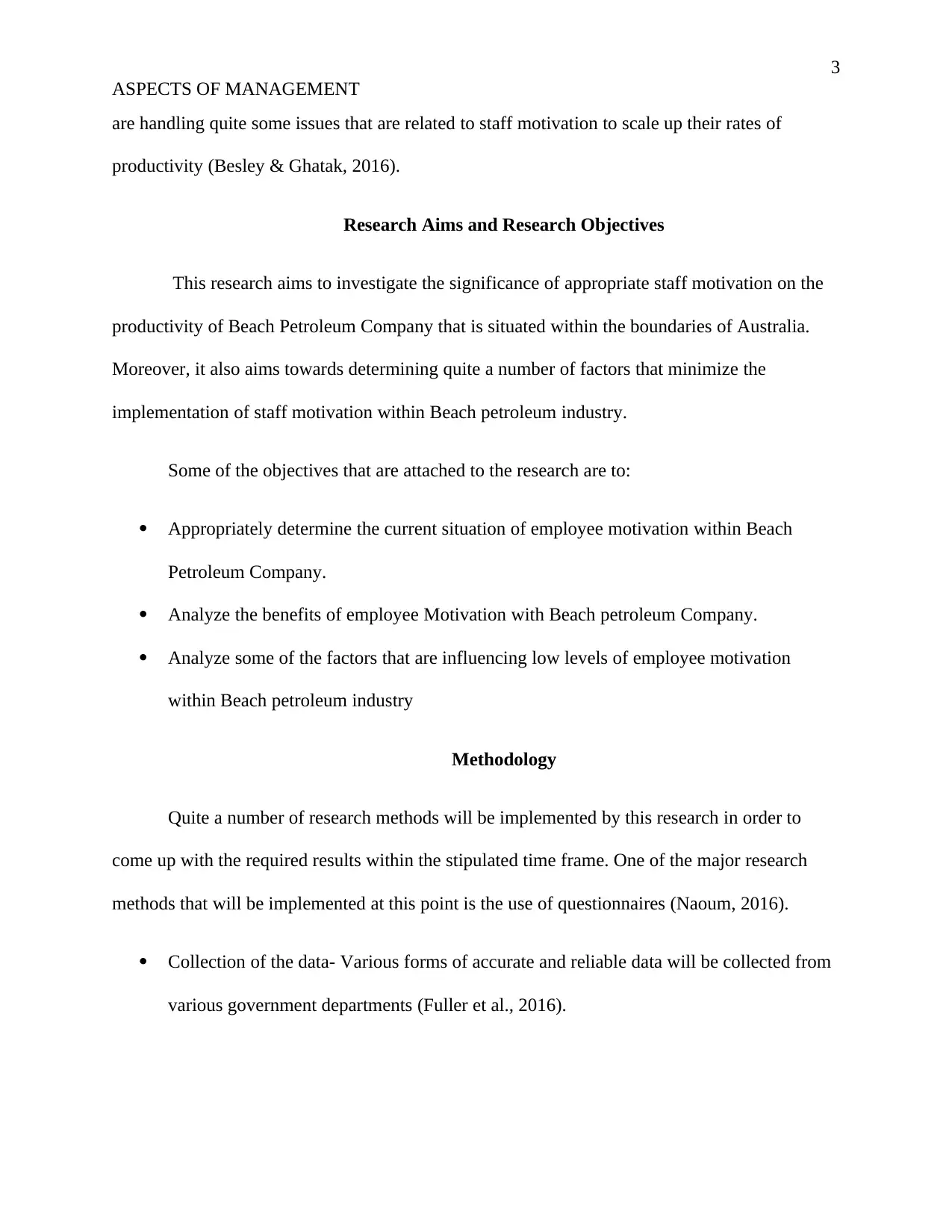
3
ASPECTS OF MANAGEMENT
are handling quite some issues that are related to staff motivation to scale up their rates of
productivity (Besley & Ghatak, 2016).
Research Aims and Research Objectives
This research aims to investigate the significance of appropriate staff motivation on the
productivity of Beach Petroleum Company that is situated within the boundaries of Australia.
Moreover, it also aims towards determining quite a number of factors that minimize the
implementation of staff motivation within Beach petroleum industry.
Some of the objectives that are attached to the research are to:
Appropriately determine the current situation of employee motivation within Beach
Petroleum Company.
Analyze the benefits of employee Motivation with Beach petroleum Company.
Analyze some of the factors that are influencing low levels of employee motivation
within Beach petroleum industry
Methodology
Quite a number of research methods will be implemented by this research in order to
come up with the required results within the stipulated time frame. One of the major research
methods that will be implemented at this point is the use of questionnaires (Naoum, 2016).
Collection of the data- Various forms of accurate and reliable data will be collected from
various government departments (Fuller et al., 2016).
ASPECTS OF MANAGEMENT
are handling quite some issues that are related to staff motivation to scale up their rates of
productivity (Besley & Ghatak, 2016).
Research Aims and Research Objectives
This research aims to investigate the significance of appropriate staff motivation on the
productivity of Beach Petroleum Company that is situated within the boundaries of Australia.
Moreover, it also aims towards determining quite a number of factors that minimize the
implementation of staff motivation within Beach petroleum industry.
Some of the objectives that are attached to the research are to:
Appropriately determine the current situation of employee motivation within Beach
Petroleum Company.
Analyze the benefits of employee Motivation with Beach petroleum Company.
Analyze some of the factors that are influencing low levels of employee motivation
within Beach petroleum industry
Methodology
Quite a number of research methods will be implemented by this research in order to
come up with the required results within the stipulated time frame. One of the major research
methods that will be implemented at this point is the use of questionnaires (Naoum, 2016).
Collection of the data- Various forms of accurate and reliable data will be collected from
various government departments (Fuller et al., 2016).
⊘ This is a preview!⊘
Do you want full access?
Subscribe today to unlock all pages.

Trusted by 1+ million students worldwide
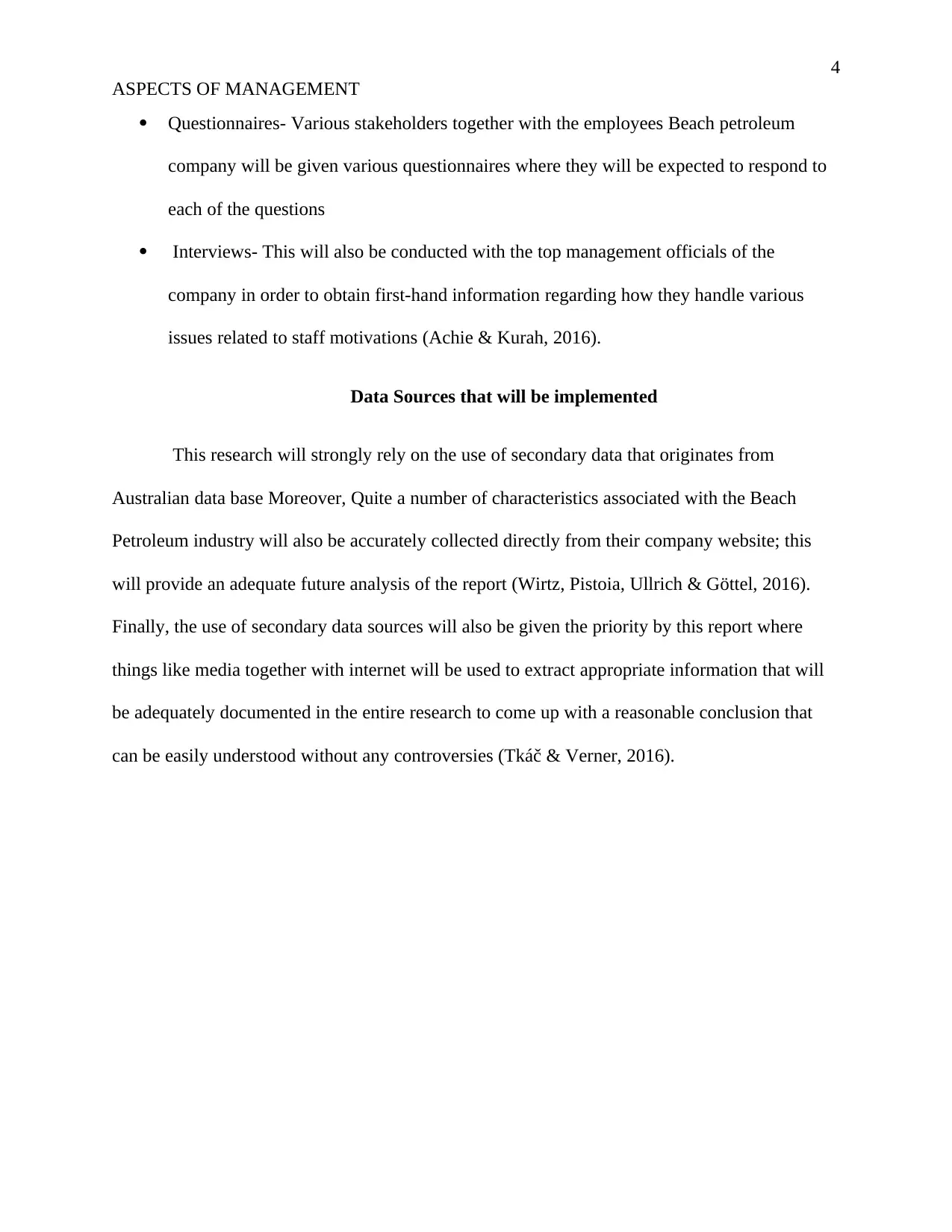
4
ASPECTS OF MANAGEMENT
Questionnaires- Various stakeholders together with the employees Beach petroleum
company will be given various questionnaires where they will be expected to respond to
each of the questions
Interviews- This will also be conducted with the top management officials of the
company in order to obtain first-hand information regarding how they handle various
issues related to staff motivations (Achie & Kurah, 2016).
Data Sources that will be implemented
This research will strongly rely on the use of secondary data that originates from
Australian data base Moreover, Quite a number of characteristics associated with the Beach
Petroleum industry will also be accurately collected directly from their company website; this
will provide an adequate future analysis of the report (Wirtz, Pistoia, Ullrich & Göttel, 2016).
Finally, the use of secondary data sources will also be given the priority by this report where
things like media together with internet will be used to extract appropriate information that will
be adequately documented in the entire research to come up with a reasonable conclusion that
can be easily understood without any controversies (Tkáč & Verner, 2016).
ASPECTS OF MANAGEMENT
Questionnaires- Various stakeholders together with the employees Beach petroleum
company will be given various questionnaires where they will be expected to respond to
each of the questions
Interviews- This will also be conducted with the top management officials of the
company in order to obtain first-hand information regarding how they handle various
issues related to staff motivations (Achie & Kurah, 2016).
Data Sources that will be implemented
This research will strongly rely on the use of secondary data that originates from
Australian data base Moreover, Quite a number of characteristics associated with the Beach
Petroleum industry will also be accurately collected directly from their company website; this
will provide an adequate future analysis of the report (Wirtz, Pistoia, Ullrich & Göttel, 2016).
Finally, the use of secondary data sources will also be given the priority by this report where
things like media together with internet will be used to extract appropriate information that will
be adequately documented in the entire research to come up with a reasonable conclusion that
can be easily understood without any controversies (Tkáč & Verner, 2016).
Paraphrase This Document
Need a fresh take? Get an instant paraphrase of this document with our AI Paraphraser
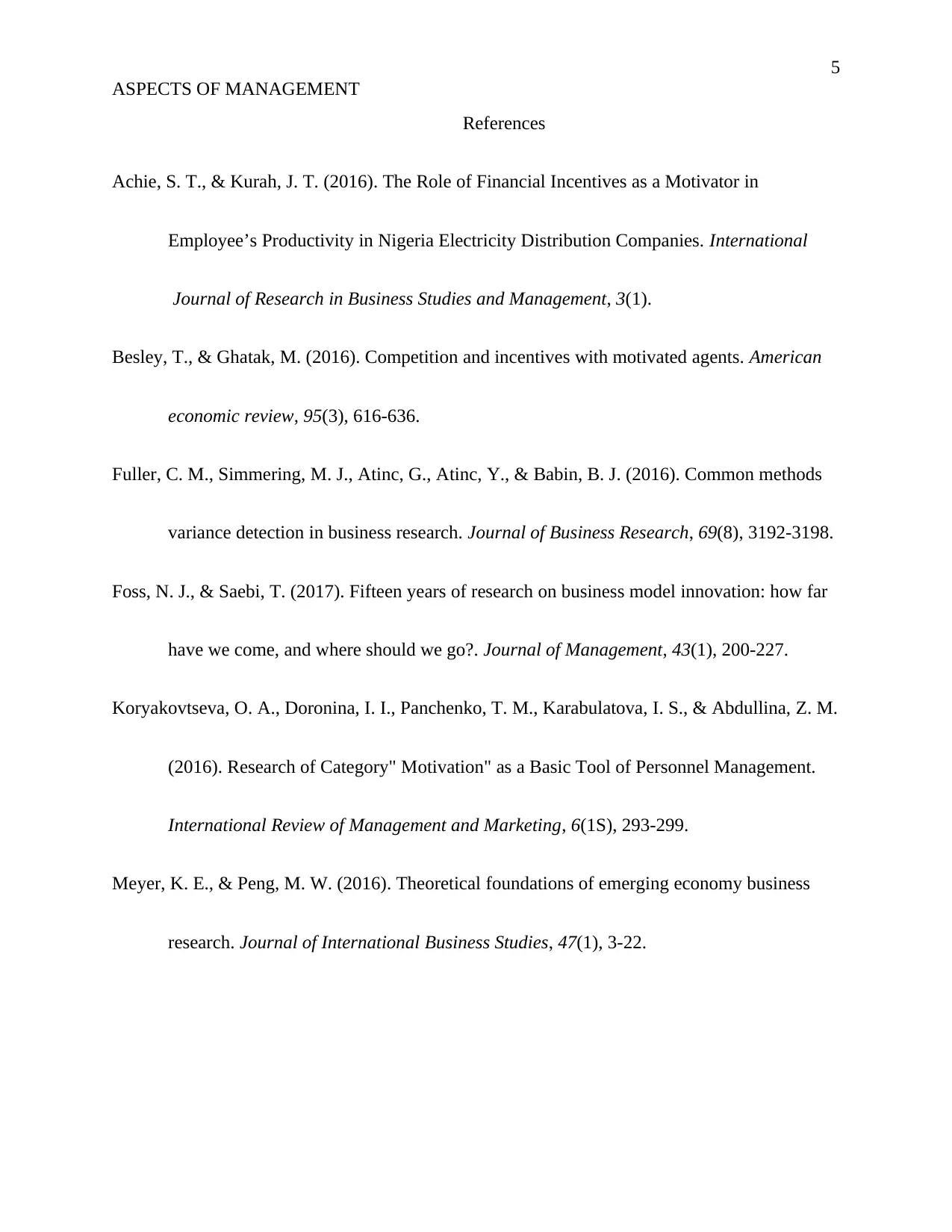
5
ASPECTS OF MANAGEMENT
References
Achie, S. T., & Kurah, J. T. (2016). The Role of Financial Incentives as a Motivator in
Employee’s Productivity in Nigeria Electricity Distribution Companies. International
Journal of Research in Business Studies and Management, 3(1).
Besley, T., & Ghatak, M. (2016). Competition and incentives with motivated agents. American
economic review, 95(3), 616-636.
Fuller, C. M., Simmering, M. J., Atinc, G., Atinc, Y., & Babin, B. J. (2016). Common methods
variance detection in business research. Journal of Business Research, 69(8), 3192-3198.
Foss, N. J., & Saebi, T. (2017). Fifteen years of research on business model innovation: how far
have we come, and where should we go?. Journal of Management, 43(1), 200-227.
Koryakovtseva, O. A., Doronina, I. I., Panchenko, T. M., Karabulatova, I. S., & Abdullina, Z. M.
(2016). Research of Category" Motivation" as a Basic Tool of Personnel Management.
International Review of Management and Marketing, 6(1S), 293-299.
Meyer, K. E., & Peng, M. W. (2016). Theoretical foundations of emerging economy business
research. Journal of International Business Studies, 47(1), 3-22.
ASPECTS OF MANAGEMENT
References
Achie, S. T., & Kurah, J. T. (2016). The Role of Financial Incentives as a Motivator in
Employee’s Productivity in Nigeria Electricity Distribution Companies. International
Journal of Research in Business Studies and Management, 3(1).
Besley, T., & Ghatak, M. (2016). Competition and incentives with motivated agents. American
economic review, 95(3), 616-636.
Fuller, C. M., Simmering, M. J., Atinc, G., Atinc, Y., & Babin, B. J. (2016). Common methods
variance detection in business research. Journal of Business Research, 69(8), 3192-3198.
Foss, N. J., & Saebi, T. (2017). Fifteen years of research on business model innovation: how far
have we come, and where should we go?. Journal of Management, 43(1), 200-227.
Koryakovtseva, O. A., Doronina, I. I., Panchenko, T. M., Karabulatova, I. S., & Abdullina, Z. M.
(2016). Research of Category" Motivation" as a Basic Tool of Personnel Management.
International Review of Management and Marketing, 6(1S), 293-299.
Meyer, K. E., & Peng, M. W. (2016). Theoretical foundations of emerging economy business
research. Journal of International Business Studies, 47(1), 3-22.
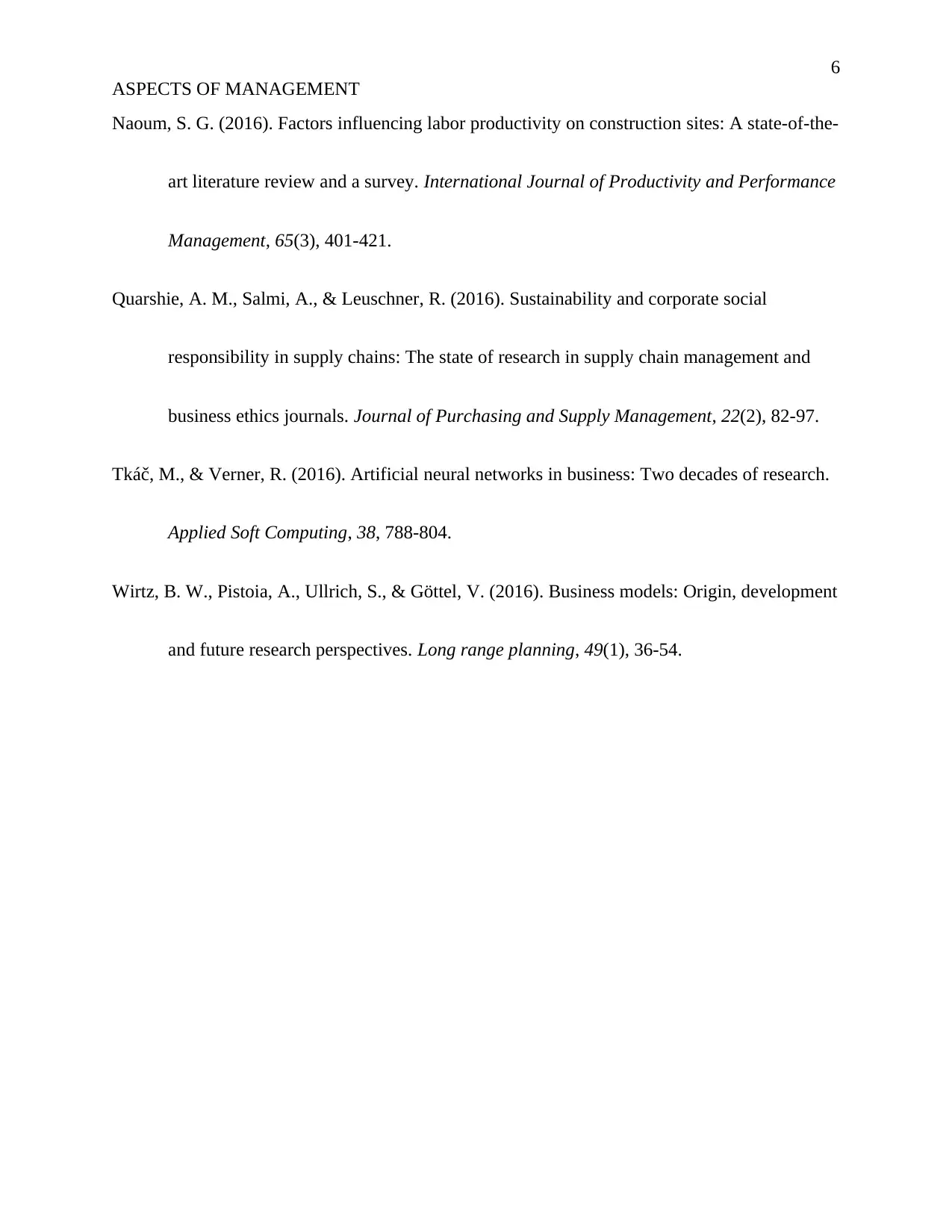
6
ASPECTS OF MANAGEMENT
Naoum, S. G. (2016). Factors influencing labor productivity on construction sites: A state-of-the-
art literature review and a survey. International Journal of Productivity and Performance
Management, 65(3), 401-421.
Quarshie, A. M., Salmi, A., & Leuschner, R. (2016). Sustainability and corporate social
responsibility in supply chains: The state of research in supply chain management and
business ethics journals. Journal of Purchasing and Supply Management, 22(2), 82-97.
Tkáč, M., & Verner, R. (2016). Artificial neural networks in business: Two decades of research.
Applied Soft Computing, 38, 788-804.
Wirtz, B. W., Pistoia, A., Ullrich, S., & Göttel, V. (2016). Business models: Origin, development
and future research perspectives. Long range planning, 49(1), 36-54.
ASPECTS OF MANAGEMENT
Naoum, S. G. (2016). Factors influencing labor productivity on construction sites: A state-of-the-
art literature review and a survey. International Journal of Productivity and Performance
Management, 65(3), 401-421.
Quarshie, A. M., Salmi, A., & Leuschner, R. (2016). Sustainability and corporate social
responsibility in supply chains: The state of research in supply chain management and
business ethics journals. Journal of Purchasing and Supply Management, 22(2), 82-97.
Tkáč, M., & Verner, R. (2016). Artificial neural networks in business: Two decades of research.
Applied Soft Computing, 38, 788-804.
Wirtz, B. W., Pistoia, A., Ullrich, S., & Göttel, V. (2016). Business models: Origin, development
and future research perspectives. Long range planning, 49(1), 36-54.
⊘ This is a preview!⊘
Do you want full access?
Subscribe today to unlock all pages.

Trusted by 1+ million students worldwide
1 out of 6
Related Documents
Your All-in-One AI-Powered Toolkit for Academic Success.
+13062052269
info@desklib.com
Available 24*7 on WhatsApp / Email
![[object Object]](/_next/static/media/star-bottom.7253800d.svg)
Unlock your academic potential
Copyright © 2020–2026 A2Z Services. All Rights Reserved. Developed and managed by ZUCOL.





